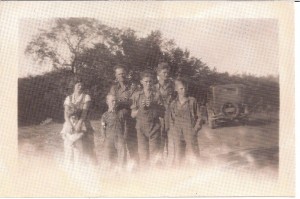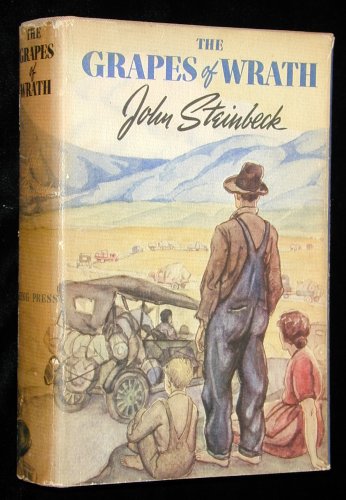My parents, both born in the early 1920’s, struggled through the Great Depression. Their families were poor even before the stock market collapse of 1929. My mother was born in an Oklahoma coal mining community. My father and his siblings were moved by my Grandfather from Oklahoma to California during the Dust Bowl. Both of my parents were regarded as “Okies” when that term was an insulting taunt of the poor.
Thus I was raised in a family that had experienced poverty and understood the prejudice that came with that label. Though I was fortunate enough to always have enough and never went a day without, I was raised to understand my roots and appreciate what I had. And the John Steinbeck novel The Grapes of Wrath was the metaphorical textbook my parents used to teach me. Though they actually disliked the story, they were quick to point out the sense of desperation and injustice was how they experienced their own youth.
I’m not sure when I first read the book, but it was certainly before I was ten years old. It was one or two decades later when a newfangled VCR allowed me to see the brilliant John Ford movie starring Henry Fonda. I remember being stunned how the details in the movie reminded me of my own family: the accents, the clothing, the cars, the dust, the fear, the hard work, and the sense of injustice mingling with a Calvinistic sense of predestination. It was as if the stories my parents told me were suddenly on the big screen.
After watching the movie I read the book a second time, and the images Steinbeck weaved were more alive for me because of such images as Henry Fonda on an old Model-T. I could see my namesake Grandfather, a widower trying to raise a bunch of boys and a couple of girls, as he drove cross-country with them in the car. I sensed the dependency the family had on each other. The genius of the book came alive again.
Perhaps even more than World War II, the Great Depression formed the psyche of my parents, which naturally had a strong influence on my own understanding of the world. How I perceive myself (wildly fortunate), how I perceive the future (preparing for the worst), how I invest my energies (saving/investing as I combat poverty and injustice) are all intertwined with that economic collapse of 80+ years ago.
More than any other book I have read, The Grapes of Wrath brings that to light and gives it a voice. And that’s why it is #24 on the list of books that have most influenced my life.
Want to read more of my top 25? Here is the list thus far:
Celebration of Discipline – #1
The Hobbit and The Lord of the Rings – #2
The Cost of Discipleship – #3
The Screwtape Letters – #4
Adventures of Huckleberry Finn – #5
Only the Paranoid Survive – #6
The Spy Who Came In From The Cold – #7
The Hitchhiker’s Guide to the Galaxy – #8
Truman – #9
Shantaram – #10
The Maltese Falcon – #11
The Shadow of the Wind – #12
Survey of the New Testament – #13
Calvin & Hobbes – #14
Celtic Daily Prayer – #15
Managing the Nonprofit Organization – #16
A Wrinkle in Time – #17
The Practice of the Presence of God – #18
Catch 22 – #19
The Tortilla Curtain – #20
The Kingdom of God is a Party – #21
Earthkeeping – #22
Reviving Ophelia – #23
The Grapes of Wrath – #24
Peanuts – #25


